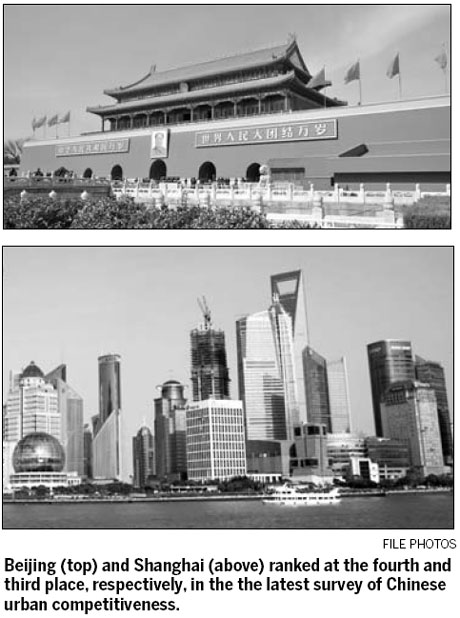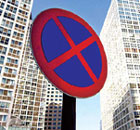Focus
Effort, not rankings, tops official's list
By Zhao Yanrong (China Daily)
Updated: 2010-05-07 08:00
 |
Large Medium Small |

For any vibrant city with a rich history, cultural treasures and global political influence, failing to top a ranking of domestic competitiveness might beget an inferiority complex.
But missing out on a medal - and trailing Hong Kong, Shenzhen and Shanghai - means Beijingers and municipal leaders should pause to reflect.
Self-knowledge is more important than the ranking, a top local official said.
"A rankings is not the crucial element of a city's development," Wang Hongzhuan, deputy director of the Beijing Investment Promotion Bureau, said in an e-mail interview.
Q: According to the latest annual report on urban competitiveness, Beijing was ranked fourth. What do you think about the ranking?
A: I think a ranking is not that important. Of course, it is valuable to analyze the ranking and use it as a reference point for Beijing's development.
The self-knowledge of our city is more important for further improvement. Do we really have a clear idea about our city? We should analyze ourselves carefully first. We try to be clear about the advantages and disadvantages of Beijing. Then the government makes an appropriate development strategy and policies based on the analyses, and carries out the decision through constructing Beijing.
If we do a good job, the position will rise automatically.
The result is important, but it should never be the only reference for how we evaluate ourselves.
Q: Would you please introduce more details about Beijing's development strategy? You said it is important for the municipal government to know what Beijing is all about?
A: We will build the northern part of Beijing around the Zhongguancun area into a high-technology industry area. In south Beijing, the Yizhuang area will connect with the Daxing district to lead an economic development zone.
The plan of Tongzhou New Town, where the local house prices have risen a lot recently, is high on the government's agenda.
We also plan to extend the Central Business District to further east and move the heavy industries, such as the Shougang Group, to west Beijing.
The area near Beijing Capital International Airport will also be developed into an important economic zone.
We will promote our development strategies and ideas to investors from home and abroad. Their support is important for Beijing's development and provides good opportunities for their businesses, too.
Q: The Shanghai 2010 Expo is now under way. What do you think the world's fair will do to foster cooperation and communication between Beijing and Shanghai?
A: Beijing and Shanghai are the two biggest cities in China. There are many things in common between the two.
Shanghai is an important industrial city. Especially after the reform and opening-up policy begun in the late 1970s, Shanghai developed at a very fast speed.
Its stability has been good for development, not only in Shanghai, but also of the Yangtze River Delta area. We are proud of the achievements made by Shanghai, particularly as host of the World Expo.
Beijing is the capital, the political center, cultural center and an important harbor for foreign exchange. Of course, Beijing is a crucial financial city. We are also proud of the development of Beijing.
Beijing is an ancient capital, with a 3,000-year history. Every lane in Beijing has a story. Each brick or tile provides an archaeological treasure. Meanwhile, Beijing is also a young and energetic city. Look at our CBD area, the five-star hotels and the Terminal 3 of Beijing Capital International Airport. Many foreign visitors are surprised by the construction in Beijing.
During the World Expo, the Beijing government is holding a "Beijing Week" in the global event from May 4 to 8.
Q: What will the Beijing Investment Promotion Bureau do for "Beijing Week"?
A: It's another good opportunity to promote Beijing to the world, after the Beijing Olympic Games.
I think the most interesting feature in the Beijing pavilion is called "Face Changes". It uses a high-technology screen which can change shapes and graphics. It's very beautiful. The Beijing pavilion also showcases traditional Beijing performances. We also moved the Olympic Village to the Expo in scale model form.







